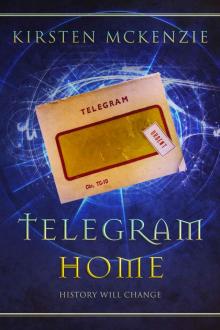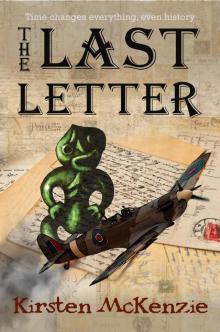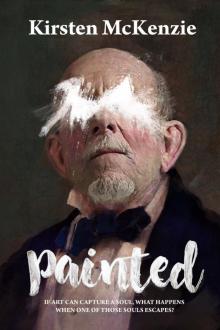- Home
- Kirsten McKenzie
Telegram Home
Telegram Home Read online
Telegram Home
Kirsten McKenzie
Published 2019
Squabbling Sparrows Press
ISBN 9780995117099
Copyright © Kirsten McKenzie 2019
The right of Kirsten McKenzie to be identified as the author of this work has been asserted by the author in accordance with the Copyright Act 1994.
The story contained within this book is a work of fiction. Names and characters are the product of the author’s imagination and any resemblance to actual persons, living or dead, is entirely coincidental.
All rights reserved. No part of this book may be reproduced, stored in or introduced into a retrieval system, or transmitted in any form, or by any means (electronic, electrostatic, magnetic tape, mechanical, photocopying, recording or otherwise) without the prior written permission of the publisher. Any person who does any unauthorised act in relation to this publication may be liable to criminal prosecution and civil claims for damages.
Also by Kirsten McKenzie
The Old Curiosity Shop Series
FIFTEEN POSTCARDS
THE LAST LETTER
TELEGRAM HOME
Standalone Novels
PAINTED
DOCTOR PERRY
Anthologies
LANDMARKS
This book is dedicated
to the real Nicole Pilcher
Thank you for that first review.
You’ll never know how
important that validation was.
Contents
THE BEGINNING
1. The Maharaja
2. The Workshop
3. The Silversmith
LONDON
4. The Girlfriend
5. The Shop
6. The Auction
7. The Interview
8. The Museum
9. The Exhibition
10. The Designer
11. The Murderer
12. The Revenge
INDIA
13. The Orders
14. The Father
15. The Troubles
16. The Carving
LIVERPOOL
17. The Officer
18. The Warehouse
19. The Box
20. The Photographer
21. The Campaign
22. The First Telegram
23. The Port
24. The Mosque
25. The Lunch
26. The Letter
27. The Intercept
28. The Authorities
INDIA
29. The Oriental
30. The Trader
31. The Game
32. The Merchant
33. The Malady
34. The Breakfast
35. The Train
36. The Survivor
37. The Business
NEW ZEALAND
38. The Mother
39. The Journey
40. The Chase
41. The Boy
42. The Licence
43. The Pipe
44. The Cart
45. The Goodbye
46. The Tribe
47. The Soldier
48. The Ambush
49. The Rifles
50. The Reunion
51. The Jeweller
52. The Arrival
53. The Armoury
54. The Worker
55. The Fire
56. The Hero
57. The Morning
58. The Patients
59. The Letter
60. The Gift
61. The Brother
ENGLAND
62. The Doll
63. The Accident
LONDON
64. The Return
65. The Aftermath
Review
Author’s Note
Cast Of Players
Acknowledgments
About the Author
THE BEGINNING
The Maharaja
Navin Pandya leaned back, abandoning his chisel and mallet on the ground next to his trusty boaster and rolled the kinks from his elbows and shoulders. In the haze of the afternoon heat he could see the clamour of activity around Maharaja Ram Singh, as he examined the work of one of his fellow craftsmen. Navin fantasised what it must be like to be part of the Singh family, the original builders of the great Jantar Mantar in Jaipur. Navin didn’t understand how any of the instruments worked, given he was just a stonemason employed for his particular skill of finishing stone to an impossible smooth surface. But he was prone to fantasy.
The heat pooling among the astronomical devices didn’t bother Navin, he worried more about the trouble he’d been having catching his breath over the past few weeks. He rubbed at his concave chest, bare under the Indian sun, his dusty fingers playing his exposed ribs like a harpsichord. Around him other stonemasons toiled away, repairing a century’s worth of damage to the magical Jantar Mantar, replacing the crumbling plaster instruments with hardier stone replicas.
A fine dust danced on the shimmering warmth, tiny imperceptible particles worming their way into the lungs of the workers, tickling and clogging organs stressed by a meagre calorie intact and unsanitary living conditions. The work was hard but it fed their families, so the men kept their complaints to themselves. Navin coughed, fighting to control his ragged breathing. He cast fretful glances towards Ram Singh, willing him not to turn. Navin needed this job but understood he was ill. He had no idea it was his work which was killing him; him and his fellow stonemasons.
Muffling his coughing in the crook of his elbow, Navin didn’t see the Maharaja approaching, untouched by the stark sunlight pouring through the site, minions tumbling behind his impressive strides.
‘Are you ill?’ asked Ram Singh, the Maharaja of Jaipur.
Navin froze. It was one thing to sneak glimpses of the Maharaja from afar, but to talk to him was unbelievable. He fought to control his coughing and shook his head, eyes watering from the effort.
‘Give the man a drink,’ directed the Maharaja.
A lackey ran forward with a cup of tepid water, which Navin gulped down.
‘Thank you,’ Navin mumbled, looking at the ground.
‘I see you are working on the Nadi Valaya Yantra. One of my favourite pieces. I’m fascinated by the connection between the northern and southern hemispheres, as represented by this piece.’
Navin could only nod because he knew nothing of its workings. Beyond recognising that there were two sun dials adorned with large bronze tablets and decorated with words in Sanskrit, his only goal was to finish the stone as smoothly as possible. How it worked didn’t worry him.
Navin’s eyes watered as he tried to stifle another bout of coughing, the strain casting him with a blueish hue. It wasn’t the violent sun changing the colour of his skin, but the silicosis destroying him from the inside out.
‘Here, take some,’ commanded the Maharaja, pulling a jewelled betel box from the folds of his robes and offering it to Navin.
One of the Maharaja’s courtiers protested, but the Maharaja waved him away.
Navin didn’t know what to do. The foreman refused to meet his eye and the courtiers looked aghast that the Maharaja showed more concern for a mere worker than the diamond-encrusted and enamelled betel box. Finally Navin took the box from the Maharaja’s manicured hands. Although small, it was heavier than he expected and he fumbled, the stunning trinket box falling towards the ground.
The crowd gasped as Navin lurched to catch the box, rescuing it an inch from the ground, sweat breaking out on his leathery brow as he flinched from the expected retribution from the foreman. Silence filled the nooks and crannies of the Jantar Mantar Observatory. No one spoke, all eyes were on the Maharaja who appeared unruffled by the near destruction of his valuable betel
box.
‘Chew the leaves, they will ease your discomfort. Return the box when your health returns. I need my workers to be healthy,’ said the Maharaja, sweeping away, leaving the treasure in Navin’s dusty hands.
As the crowd scurried away, the foreman cast murderous glances back at Navin, his thoughts clear — Navin’s coughing and interaction with the Maharaja had brought shame upon them. Navin waited until the group disappeared from sight before opening the box to find fresh betel leaves wrapped around the nuts. The bright green waxy leaves reflected the brilliant sun over Navin’s bare shoulder until a bank of clouds appeared on the horizon, chasing the sunshine away, lowering the temperature and sending uncomfortable shivers through his weakened body.
Navin shoved a handful of glossy leaves into his mouth, and chewed with his eyes closed, waiting for the promised pain relief, missing the arrival of the blackened clouds, only opening his eyes when the first rain pellets hit his emaciated body. Tucking the Maharaja’s box under his arm, Navin scooped up his tools and ducked under the southern side of the equatorial double sundial, sheltering as best as he could from the torrential rivers of water running through the site. Triumphant thunder drowned out the shouts and screams of the stonemasons. Overcome by the effects of the betel nut, Navin leaned into the yellow stone of the Nadi Valaya Yantra; the rain and his illness and the side effects of the nut lulling him to a temporary stupor.
After the thunder came the lightening. Jagged and relentless, it lit the sky again and again, casting Daliesque shadows across the landscape, transforming the site to a surrealist’s dreamscape.
Navin never felt the lightning curl around the corners of the astrological device he was sheltering behind, corners he had smoothed to an impossible level. The lightning flashed against the dial, illuminating the mysterious characters designed long ago by the true master of the Jantar Mantar — Jai Singh. Navin had no awareness of the electrical current conducted through his body by the elegant betel box under his arm. The current raced through his neurons short-circuiting every connection. His limbs jerked, pulled by unseen electrical strings, the gods playing cruel puppet masters with the workman.
Then the earth plunged into complete and utter darkness, the solar eclipse completing the work started by the storm clouds, removing any fragment of light. In that moment, Navin’s life ended, his soul ripped from his body and pulled into the ether of the universe. The betel box slipped from his lifeless body, coming to rest in his lap.
A shadow emerged from behind another astronomical piece, and a boy darted through the blanket of rain. A street urchin, barely old enough to be out alone, wearing an outfit held togetherby nothing more than the whisper of a promise. Crouched on the lip of the structure, one hand against the bronze plaque for balance, the boy poked Navin with a skinny finger. When he didn’t move, Sanjay the urchin reached for the jewelled box laying in Navin’s lap.
A flash of lightning and a clap of thunder cut off the screams of the child, with silence following. The boy had vanished with the betel box. Only Navin’s body remained under the angled southern equatorial face.
The Workshop
The noise in the workshop was diabolical, filled with the relentless stamping of dies, the clanking of voices, over and over, as if the earth itself shuddered with every drop of the dozens of die stamps lined up against the red brick wall.
Sanjay was in a magical world. His mouth was dry and his head full of cotton and even the sound of his own breathing was foreign to his ears. And it was freezing, his body bound by a coldness he’d never known.
Tucked under a wooden workbench, Sanjay caught glimpses of white-coated men, business on their white faces, clutching pieces of silverware. None them looked amenable to an urchin hiding in their workshop. He clutched his betel box tighter to his chest. If any of them found him, they’d be sure to accuse him of stealing the intricate silver box - which was the truth. But he hadn’t stolen it from anyone here, in this other-worldly place he didn’t recognise.
In Sanjay’s short, short life, he’d never once left the confines of Jaipur. He’d ranged far and wide through the alleyways and back passages of homes who never knew he’d been deep inside them, stealing tiny trinkets no one ever missed. But he had never seen anywhere where the people were all dipped in a lime wash—the colour flushed from their cheeks and bleached from their hair.
With eyes wider than saucers, he shrank deeper into the shadows, his tattered clothing no defence against the bitter English winter. He could see the red heat of the furnaces in the bowels of the workshop but their intensity didn’t penetrate this far. A clap of thunder sounded above the building, causing the men at the workbenches to shrink from the windows. Lightning followed, splitting the sky the way a hot knife slices through butter. The rain outside sucking the soul from anyone foolish enough to venture out.
And still no one noticed the boy shivering beneath the workbench.
Only a second ago, Sanjay had been wiping sweat from his brow in the shadow of the world’s largest sundial in Jaipur, India, and now… he wasn’t sure where he was.
A horn sounded, like the hunting horn the Maharaja’s court used. He’d seen them set off, a huge procession of mahouts, and riflemen, and minor royals armed with katars they didn’t know how to use, carrying them as decorative pieces, passed down through the generations. And like those hunting parties he’d watched from afar, when the horn sounded, the workmen downed their tools and shrugged off their white coats, hanging them on a tidy line of hooks. A relative silence descended, allowing the wash of feminine voices to filter through to Sanjay’s hiding place. The swish of long skirts filtered past him, as black leather-booted women followed the men from the workshop, abandoning their places by the frosted windows, each pulling gloves on over frozen fingers, tired from hours of work hunched over their scarred wooden benches.
The sharp angles of the silver betel box dug into Sanjay’s exposed ribcage, but he hugged his treasure closer to his skinny frame. As the rooms emptied, dusk settled over the city. Paul de Lamiere’s workshop was an eery place after dark, the long rope pulleys swaying in unseen breezes, the heavy dies forming grotesque shapes where they lay, and the partially completed work took on animal forms with sinuous tendrils stretching towards Sanjay.
Sanjay’s stomach growled, but experience said he’d survive a bit longer before he needed to eat. The hunger in his belly didn’t bother him—he’d been hungry before, and would be again. Food could wait, hiding was more important because you couldn’t eat if you were dead. At least he was inside and dry. The weather outside assailed the building like an army holding siege to a great fort. The rain on the roof had turned from pregnant droplets to icy hail. He’d controlled his own destiny for longer than he remembered. Left to fend for himself by an overwhelmed mother and an absent father, Sanjay had no problem caring for himself and scavenging, or stealing to survive. He also knew when it was best to scarper before they found him where he shouldn’t be.
Other than the howling storm outside, which seemed to have followed him from India, the building was silent, yet still he waited, and waited. His mind filled with a thousand different thoughts and imaginations, but his innate sense of self preservation kept him alert, and when he was sure he was alone, he slipped out of his hidey-hole, his freezing body shaking from the cramped position he’d adopted. Sanjay pulled one of the white coats off its hook and wrapped himself up, the thick cotton a blanket of wool on his bare skin.
Sanjay wandered around the silversmith’s workshop, the too-long coat dragged behind him, collecting tiny slivers of silver which lay in the cracks between the wooden floorboards, opening drawers and lifting lids, each movement as quiet as the blooming of a rose. The moonlight struggled to penetrate the frosted glass in the windows, making even the mundane piecework look elegant, but nothing he saw was as spectacular as a pair of giant candelabra posed on a polished desk, their monstrous arms reaching towards the heavens.
Still listening for potential threats
, Sanjay stepped closer to peer at the shell and rock motifs common to the Rococo style. As he considered the practicalities of spiriting one away to sell, he ran a finger over the base of the nearest candelabra. A flash of lightning struck and lit the entire room at the same second his touched the candelabra, at the precise moment the polished silver absorbed a burst of pure energy from Sanjay’s fingertip.
The exchange of energy so fleeting, that Sanjay was oblivious to the event. He was not oblivious to the monster of a man illuminated by the lightning flash, a man standing in the doorway, a white coat hanging in his hands.
The lightning vanished, and the giant lurched towards him, yelling in an unintelligible language.

 Telegram Home
Telegram Home The Last Letter
The Last Letter Doctor Perry
Doctor Perry PAINTED
PAINTED